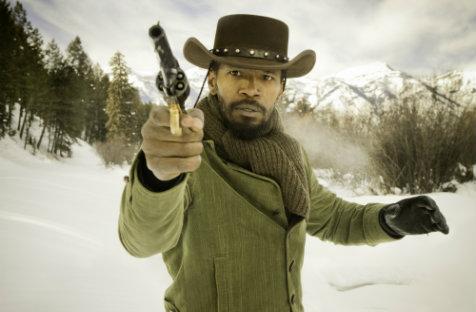The jaunty jingle that shares its protagonist’s name, the blood red lettering that splashes its title on screen, and the symmetry of the opening shots aren’t the only elements of Sergio Corbucci’s Django aped in Quentin Tarantino’s eighth feature. Nor are its appropriation of plot and premise, or the special participation of its star Franco Nero; but rest assured, the part-homage, part-reinterpretation that comprises Django Unchained is far more than a mere remake.
In Tarantino’s hands, the latest addition to the Django canon – with more than 100 other films unofficially following the 1966 original – is a concise, calculated love letter to a genre revered by the writer/director. As he did previously with heist capers (Reservoir Dogs), martial arts epics (Kill Bill: Vol 1 and Kill Bill: Vol 2), grindhouse fare (Death Proof) and war films (Inglourious Basterds), the auteur crafts the spaghetti western he has always wanted to see, complete with cartoonish violence, crackling conversations, and a witty, wicked sense of humour.
His Django (Jamie Foxx, Horrible Bosses) starts the film as a slave with romance and revenge on his mind. Sought out by dentist-turned-bounty hunter Dr King Schultz (Christoph Waltz, Carnage) to assist in procuring a trio of wanted men, Django earns his freedom and a new friend. After their deed is done, and winter passes with the former captive as the bounty hunter’s deputy, Schultz agrees to aid Django in rescuing his wife Broomhilda (Kerry Washington, TV’s Scandal) from plantation owner Calvin Candie (Leonardo DiCaprio, J. Edgar) and his head servant Stephen (Samuel L. Jackson, The Avengers).
Their journey through the vistas of the pre-Civil War American south is steeped in the seditious genre’s history and political commentary, and replete with references to the obvious (Sergio Leone’s Man With No Name trilogy) and the obscure (Corbucci’s post-Django fare of Navajo Joe and The Great Silence, as well as Sergio Sollina’s The Big Gundown). As the bold, bloody film unwinds in a joyously assembled procession of spaghetti western tropes, its acknowledgement of the director’s history is also revealed, from the familiar structure and his anachronistic tendencies to an obsession with fluid identities and archetypes.
Tarantino moulds his internal and external influences into an irreverent, rambunctious amalgam, boasting the exacting dialogue and audacious characters that have become trademarks of his work. His other area of expertise – extracting excellent, against-type performances – is also on display. Waltz’s inimitable mastery of the verbose exchanges and Jackson’s prosthetic-fuelled villainy surpass their previous efforts under the helmer’s guidance, while first-timers Foxx and DiCaprio perfect the simmering restraint and relished depravity of their respective, adversarial roles.
Despite their evident enthusiasm and snappily-edited energy, and the narrative’s pithily-photographed scenes of cruelty and carnage, an undercurrent of solemnity is also at play; the pulpy leanings, revisionist views of the past and subverted stereotypes are presented to amplify the ferocious horrors of Tarantino’s topic. Beneath the excess lurks a transcendence of blaxploitation as befitting the racial horrendousness depicted, with every intolerant exchange and provocative act highlighting an all-too-accurate cultural climate.
Accordingly, Tarantino not only entertains with panache but uses the film’s pastiche-laden packaging to empower the truths behind its content. A rare but apt feat given its inspiration, and a resounding achievement of brazen and brutal proportions, Django Unchained more than earns the audience’s curiosity, interest and exhilaration.
Rating: 4 ½ stars
Django Unchained
Director: Quentin Tarantino
USA, 2012, 165 min
In cinemas January 24
Distributor: Sony
Rated MA
Actors:
Director:
Format:
Country:
Release:





